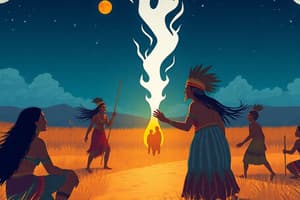Podcast
Questions and Answers
Which of the following is true about bodily adornments in Indigenous cultures?
Which of the following is true about bodily adornments in Indigenous cultures?
- They are primarily made of clothing
- They indicate social status and individuality (correct)
- They are more common in Western cultures
- They are only used in nonverbal communication
In classical Greek and Roman cultures, nudity was
In classical Greek and Roman cultures, nudity was
- Depicted in art (correct)
- Considered shameful
- Only allowed in private spaces
- Associated with low status
Which religions viewed the body as shameful and required modest dress?
Which religions viewed the body as shameful and required modest dress?
- Abrahamic religions (correct)
- Post-classical religions
- Classical Greek and Roman religions
- Indigenous religions
Europeans made interpretations of indigenous nakedness based on
Europeans made interpretations of indigenous nakedness based on
What is the main focus of the text?
What is the main focus of the text?
Which of the following is NOT mentioned as a form of bodily adornment in Indigenous cultures?
Which of the following is NOT mentioned as a form of bodily adornment in Indigenous cultures?
What is the main focus of the text?
What is the main focus of the text?
Which cultures viewed nudity as normal in many situations?
Which cultures viewed nudity as normal in many situations?
What were Europeans' interpretations of indigenous nakedness based on?
What were Europeans' interpretations of indigenous nakedness based on?
Which religions viewed the body as shameful and required modest dress except in private spaces or when segregated by sex?
Which religions viewed the body as shameful and required modest dress except in private spaces or when segregated by sex?
Flashcards are hidden until you start studying




